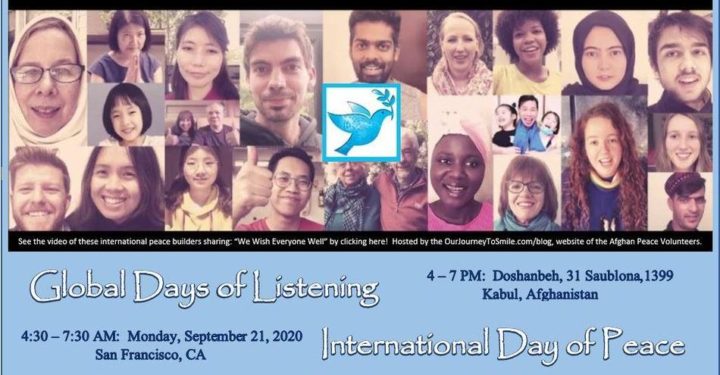Noted entertainer and founder of an effective method of communicating, Alan Alda is quoted as saying, “Listening is being able to be changed by the other person”.
In dual celebration of the International Day of Peace and the tenth anniversary of Global Days of Listening (globaldaysoflistening.org), a worldwide audience tuned in to the Livestream page to hear a three hour presentation from The Peace Exchange, Chicago (peacex.org), Professor Wynd Kaufman, Engineering faculty member of City College of San Francisco and Italian educators, journalists, activists Veronica Tarozzi and Cristina Mirra to discuss post-pandemic innovations in education and promoting nonviolence.
The Global Days of Listening enables ordinary people across the world to transcend barriers of distance and language, to speak to one another with the help of translators about life in their respective countries and their wish to live without war. This is a direct, person-to-person conversation. The Global Days of Listening was inspired by the Afghan Peace Volunteers, (http://ourjourneytosmile.com/blog/), a grassroots, multi-ethnic group of young Afghans seeking lives of nonviolence, self-reliant equality, and non-military solutions for Afghanistan and beyond. The GDoL sessions take place on the 21st day of each month. People can connect directly to hear via Livestream. Those who wish to speak must register by contact through the website. GDoL has been organized cooperatively over ten years by many peace and justice organizations.
For the final segment of the transmission, Veronica Tarozzi (Pressenza Italy) began the conversation, when asked by host, Buddy Bell of Voices for Creative Nonviolence (http://vcnv.org/) about dealing with real, existing situations in the world. She offered agreed consensus on changing awareness and the collective need for peace activism with her statement, “we don’t want to go back to what we had.” As she spoke, her words were translated and the information relayed to the Afghan Peace Volunteers in Kabul. “We must awaken the full potential of empathy so that the new generations are aware; that they understand and have no fear of each other.” Starting young to educate in nonviolence, something that children innately already know, will reinforce mutual understanding, she emphasized. “We must have the courage to speak out loud for what we believe.”
Cristina Mirra (Pressenza Italy) then spoke about offering real role models representing the kind of maternal beauty and kindness that will give rise to an understanding of connecting and sharing in our daily lives with love and care.
A question regarding the extent of Italian public knowledge of conditions in the world, such as arms production and sales, land mines and militarism. Both women spoke about the influence of traditional media, the ‘cavalier’ disinterest of mainstream media journalists for such topics, and the mission of Pressenza as part of an alternative international media choice providing the public with an ‘on the ground’, day-to-day, multilingual humanist perspective.
Continuing with positive initiatives in education to explore, Cristina and Veronica presented their ancillary, geopolitical programs designed to collaborate with willing classroom teachers to explore relevant social, economic, political issues with their students through their own guided research and expression. The project aims to invite young people to become “researchers” and to understand the complex international reality by becoming active protagonists of their time with Metaeducazione. For more information, visit the website: https://ontheroadcommunity.wordpress.com/ or contact info@metaeducazione.it
During the final minutes of the Global Day of Listening, everyone gave gratitude for the successful opportunity to connect worldwide, to listen, to understand, to communicate, and to better learn about one another. If there is one lesson that emerges from the barrage of our continued media stream, it is that “Listening” is an integral part of any meaningful dialogue.
“Communication is headed for success when we pay more attention to what the other person is understanding rather than focusing solely on what we want to say.” -Alan Alda (https://www.aldacenter.org/alda-method)










